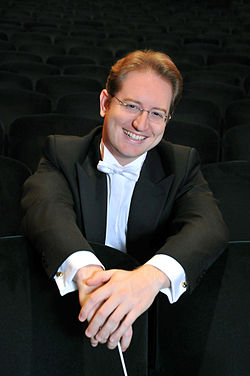Palm Beach Symphony offers uneven rewards at Four Arts
In recent seasons, Ramon Tebar’s work as music director of Florida Grand Opera has been consistently impressive. The Spanish conductor has greatly improved the company’s orchestra and led strongly conceived, impassioned performances of both standard and more rare operatic repertoire.
At the opening program of the Society of Four Arts concert series in Palm Beach, Tebar conducted members of the Palm Beach Symphony, of which he is also music director, in works by Chopin, Grieg and Tchaikovsky. The all-string ensemble includes many members of the FGO orchestra.
Tebar’s resume indicates he has conducted numerous concerts with second-tier orchestras in Europe, South America and Russia. Yet on the basis of Wednesday night’s performance, Tebar seems less at home on the orchestral podium than in the opera pit. At times he tended to pull and break the musical pulse and flow, veering toward exaggeration. Despite much good playing, there were moments of orchestral insecurity.
The concert got off to an unpromising start with a heavy handed orchestral introduction to Chopin’s Piano Concerto No. 1 in E minor. Tebar’s very slow tempos were compounded by problems with the violins’ intonation and the orchestra seemed to be struggling through the initial tutti. With the entrance of the soloist, however, the performance changed dramatically.
Augustin Anievas amassed a considerable reputation as an interpreter of Beethoven, Chopin and Rachmaninoff with major recordings and international engagements in the 1970’s and 80’s. Now an octogenarian and Miami resident, Anievas is still an impressive player. To be sure his performance was not perfect. He dropped a few notes and had a memory lapse at the beginning of the third movement. Still he offered fine Chopin playing , putting a personal stamp on the music while observing the niceties of romantic style and pianistic command.
Anievas brought tremendous authority to the melodic curves and he can still execute triplets and filigree with clarity and accuracy. His beautifully etched reading of the second movement Larghetto was almost Mozartean, connecting the musical spaces between the classical salon and Chopin’s more impulsive writing.
After quickly recovering from his brief lapse, Anievas tackled the final Rondo with rhythmic verve and virtuosic flourishes, the keyboard spanning runs spot on and transparent. Anievas’ sense of musical taste and immediacy and total identification with Chopin’s idiom could well be emulated by many younger pianists.
At times balance between soloist and ensemble went awry. In the third movement, Tebar’s tread was too heavy and he exaggerated the retards after the initial brusque chords.
The ensemble improved considerably in the concert’s second half. Well-rehearsed traversals of Grieg’s Holberg Suite and Tchaikovsky’s Serenade for Strings brought some vigorous, crisp playing. The charming Grieg score was particularly notable for austere and meditative renderings of the Sarabande and Air. The first-chair violin and viola players delightfully imitated country fiddlers in a robust Rigaudon but the Gavotte needed a touch more of that folk-infused seasoning.
Tchaikovsky’s ubiquitous Serenade in C Major was beautifully played, the string sonority deep and full in the mellow and resonant acoustics of the Four Arts’ elegant auditorium. The violins’ unity and articulation was striking, particularly in the many exposed passages.
The first movement was marred, however, by lack of dynamic variety, the music assayed at unrelenting volume. Also the strings’ vibrato was far too heavy and exaggerated. These problems seemed to disappear in later movements where there were more gradations between softness and powered outbursts. At a fast tempo, the second movement Valse sparkled and the Elegy was strongly Russian in tone. After an astutely paced introduction, the finale was played in a no-nonsense manner with plenty of vigor.
The Four Arts concert series continues with “An Appalachian Christmas” featuring Mark O’Conner & Friends 8 p.m. December 10 at the Society of Four Arts in Palm Beach. fourarts.org; 561-655-7226.
Posted in Performances
Leave a Comment
Thu Dec 4, 2014
at 11:41 am
No Comments







